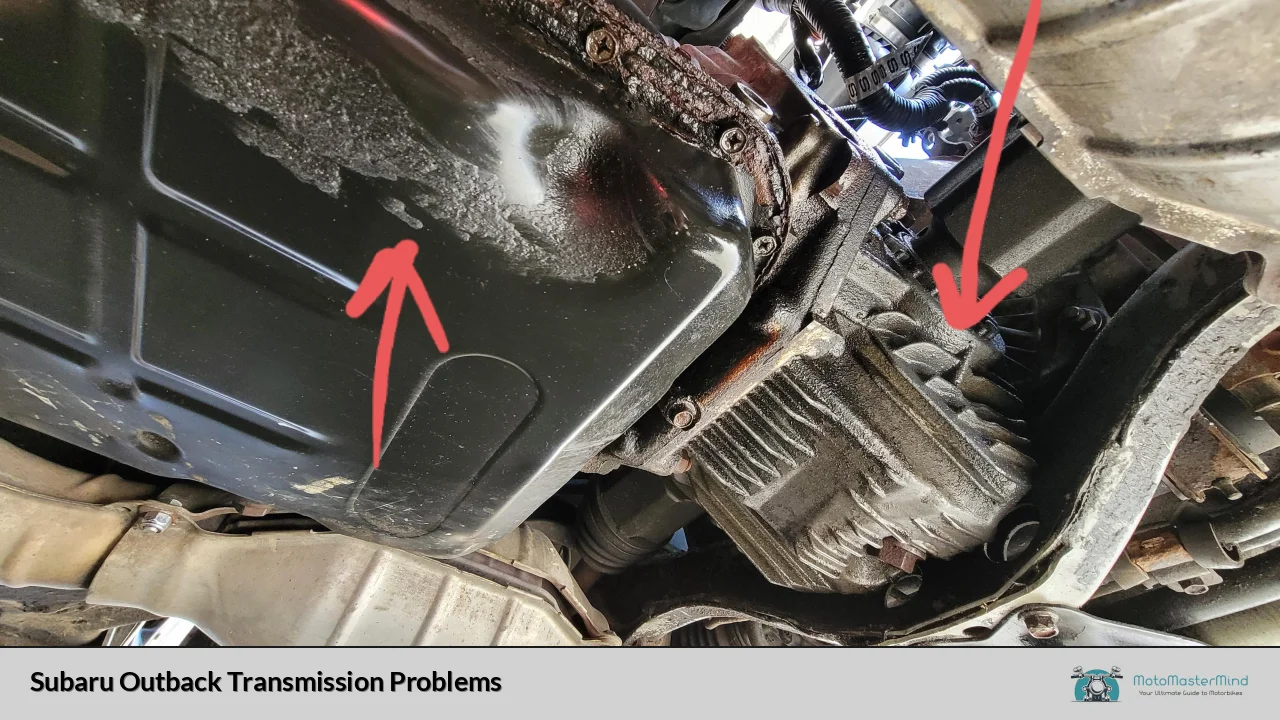Are you frustrated with your Subaru Outback’s transmission? You’re not alone. Many Subaru owners have faced transmission problems that can be quite a headache. In this article, we’ll take a closer look at some common Subaru Outback transmission issues and what you can do to address them.
One of the most reported problems is a shuddering or jerking sensation during acceleration. It feels like the car is hesitating or struggling to gain speed. This issue can be caused by a faulty torque converter or a worn-out transmission fluid pump. If you experience these symptoms, it’s best to have your vehicle inspected by a qualified mechanic who can diagnose the exact cause and recommend the appropriate solution.
Another concern that Outback owners encounter is a transmission leak. A leak can occur due to a damaged seal or gasket, leading to fluid loss and potential damage to the transmission system. If you notice red or brown fluid spots underneath your car, it’s crucial to have the leak addressed promptly to prevent further complications. Ignoring a transmission leak can result in costly repairs down the line.
Additionally, some Subaru Outbacks may suffer from a failure of the transmission control module (TCM). The TCM is responsible for managing the shifting of gears and ensuring smooth operation. When the TCM malfunctions, you may experience erratic shifting, gear slippage, or even complete transmission failure. Seeking professional assistance is vital if you suspect TCM issues, as reprogramming or replacing the module might be necessary.
To mitigate these potential transmission problems, regular maintenance is key. Follow Subaru’s recommended service intervals for fluid changes and ensure that the correct type of transmission fluid is used. Regular inspections by a trained technician can help identify any emerging issues early on and prevent major breakdowns.
Subaru Outback transmission problems can be an inconvenience and a source of stress for owners. Shuddering during acceleration, leaks, and malfunctioning TCM are among the common issues faced. By staying proactive with maintenance, promptly addressing any signs of trouble, and seeking professional help when needed, you can keep your Subaru Outback running smoothly on the road ahead.
Unraveling the Mystery: Are Subaru Outback Transmission Problems More Common Than We Think?
Are Subaru Outback transmission problems more common than we think? It’s a question that has been on the minds of many car enthusiasts and potential buyers. Let’s dive into this intriguing topic and unravel the mystery surrounding the reliability of Subaru Outback transmissions.
When it comes to automobiles, the transmission plays a vital role in transferring power from the engine to the wheels. Any issues with the transmission can lead to a host of problems, ranging from poor performance to complete failure. So, are Subaru Outback owners facing an alarming number of transmission troubles?
Fortunately, the overall reputation of Subaru Outback transmissions remains solid. While no car is entirely immune to mechanical issues, Subaru Outbacks have garnered a reputation for reliability. The majority of Subaru Outback owners enjoy trouble-free driving experiences without any transmission-related concerns.
However, it’s essential to acknowledge that every vehicle model may have its fair share of reported problems. Some Subaru Outback owners have encountered transmission issues such as shuddering, slipping gears, or delayed shifting. These problems, though not widespread, do exist.
It’s important to note that Subaru has taken steps to address these concerns. In recent years, they have made improvements to their continuously variable transmission (CVT) systems, which are predominantly used in Subaru Outbacks. These enhancements aim to enhance durability and minimize the likelihood of transmission-related issues.
If you’re considering purchasing a Subaru Outback or currently own one, there are proactive measures you can take to mitigate potential transmission problems. Regular maintenance and servicing are crucial. Following the manufacturer’s recommended maintenance schedule, including fluid changes, can help prevent premature wear and extend the lifespan of your transmission.

Additionally, being mindful of your driving habits can make a difference. Avoiding aggressive acceleration or sudden braking can reduce stress on the transmission and promote its longevity. Treat your Subaru Outback transmission with care, and it will serve you well for miles to come.
While Subaru Outback transmission problems may exist, they are not as rampant as some might fear. Subaru has made strides in improving their transmissions, and many owners enjoy trouble-free driving experiences. By staying proactive with maintenance and adopting responsible driving habits, you can minimize the likelihood of encountering any transmission-related issues. So, embrace the versatility and reliability of the Subaru Outback with confidence, knowing that its transmission is more reliable than the rumors would have you believe.
From Gear Grinds to Stalling: Exploring the Troubling Trend of Subaru Outback Transmission Issues

Are you tired of dealing with frustrating transmission problems in your Subaru Outback? If so, you’re not alone. Many Subaru Outback owners have been experiencing a troubling trend of transmission issues that range from gear grinds to stalling. In this article, we will delve into the details of these problems and explore why they are occurring.
One common problem reported by Subaru Outback owners is gear grinding. This occurs when there is difficulty shifting gears smoothly, resulting in a grinding or clunking sound. It can be a jarring experience and is often a sign of a worn-out clutch or synchronizer. The gear grinding issue can make driving your Outback a less pleasant experience and may even lead to further damage if not addressed promptly.
Another concern is stalling. Some Subaru Outback owners have reported instances where their vehicle unexpectedly stalls while driving or idling. This sudden loss of power can be quite dangerous, especially if it happens in the middle of traffic. Stalling can be caused by various factors, including a faulty sensor, a clogged fuel line, or an issue with the ignition system. Whatever the cause, it’s crucial to get it diagnosed and fixed to ensure your safety on the road.
So, why are these transmission issues happening in Subaru Outbacks? One possible explanation is related to the design and manufacturing process. Like any complex machinery, cars can sometimes have components that are prone to wear and tear or have manufacturing defects. Another factor could be the lack of regular maintenance or improper driving habits, such as aggressive shifting or neglecting to change the transmission fluid at recommended intervals.
The troubling trend of transmission issues in Subaru Outbacks, including gear grinding and stalling, is a cause for concern among owners. Whether it’s due to design flaws, manufacturing defects, or maintenance neglect, these problems can affect your driving experience and pose safety risks. If you’re experiencing these issues, it’s advisable to consult with a reputable mechanic or authorized Subaru service center to diagnose and address the problem promptly. Remember, proper maintenance and care are essential for keeping your Subaru Outback running smoothly and reliably for years to come.
Owners Beware: The Achilles’ Heel of Subaru Outback Revealed – Transmission Woes
Hey there, car enthusiasts! Buckle up and prepare for a wild ride as we delve into a topic that has been raising eyebrows in the automotive world. Today, we’re unearthing the Achilles’ heel of the beloved Subaru Outback – its transmission. Owners, beware!
Picture this: you’re cruising down the road, wind in your hair, enjoying the smooth ride of your trusty Subaru Outback. Life is good until suddenly, you feel a jolt, a hesitation, or maybe even a downright refusal to shift gears. Your heart sinks, and frustration sets in. What could be causing these transmission woes?
Unfortunately, it seems that Subaru Outback owners have been facing some challenges with their transmissions. Now, before we go any further, let’s make one thing clear: the Subaru Outback is an exceptional vehicle renowned for its versatility and reliability. However, like any other machine, it has its weak points.

So what’s going on under the hood? One of the primary concerns revolves around the continuously variable transmission (CVT) used in certain Subaru Outback models. While CVTs are known for their fuel efficiency and seamless shifting, some owners have reported issues such as shuddering, jerking, or even complete transmission failure.
These problems can arise due to a variety of factors. Over time, wear and tear can take its toll on the transmission components, leading to subpar performance. Additionally, inadequate maintenance or improper fluid levels can exacerbate the situation. It’s crucial for Subaru Outback owners to prioritize regular maintenance checks and address any potential issues promptly.
Now, I know what you might be thinking: “Should I steer clear of the Subaru Outback altogether?” The answer isn’t a simple yes or no. While transmission woes have affected a portion of owners, it’s important to remember that many others have had trouble-free experiences with their vehicles. Furthermore, Subaru has been proactive in addressing these concerns by making improvements to their transmissions and offering extended warranty coverage for certain models.
If you’re considering a Subaru Outback, it’s essential to be aware of the potential transmission issues that some owners have faced. Stay proactive with maintenance, keep an eye on fluid levels, and address any early warning signs promptly. Remember, the Achilles’ heel doesn’t define the entire vehicle, and with proper care, your Subaru Outback can continue to be a reliable companion on all your adventures.
Transmission Turmoil: Why Subaru Outback Owners Are Feeling the Shift’s Discontent
Subtitle: Unraveling the Challenges with Subaru Outback Transmissions
Are you a proud owner of a Subaru Outback? If so, you may have experienced some discontent with its transmission. Let’s dive into the transmission turmoil that Subaru Outback owners are facing and understand the reasons behind it.
One of the primary concerns among Subaru Outback owners is the reliability of the transmission system. While Subaru is known for its durable vehicles, some Outback models have encountered issues related to the transmission. These problems can manifest as clunky shifting, delayed engagement, or even complete failure of the transmission.
The discontent arises from the fact that the transmission is a vital component of any vehicle, responsible for transferring power from the engine to the wheels. When the transmission doesn’t perform optimally, it affects the overall driving experience and can lead to costly repairs.
Subaru Outback owners who have faced transmission problems often wonder what causes these issues. One common culprit is a manufacturing defect, where certain batches of transmissions may not have been built to the highest standards. This can result in premature wear and tear, leading to frequent breakdowns.
Another potential cause is inadequate maintenance. Regular transmission fluid changes and inspections are crucial to keeping the transmission in good condition. Neglecting these essential steps can accelerate wear and increase the likelihood of transmission issues.
Furthermore, some drivers believe that the continuously variable transmission (CVT) used in many Subaru Outback models contributes to the problem. While CVTs are designed to provide seamless acceleration and improved fuel efficiency, they can be prone to certain issues over time.
Subaru has acknowledged these concerns and has taken steps to address them. In recent years, they have made improvements to their transmission designs and issued technical service bulletins to provide guidance on resolving specific issues. It’s advisable for Subaru Outback owners to stay informed about any updates or recalls related to their vehicle’s transmission.
Subaru Outback owners have experienced a fair share of transmission turmoil. Whether it’s due to manufacturing defects, inadequate maintenance, or concerns with the CVT system, these issues can disrupt the driving experience and incur additional costs. If you’re an Outback owner, it’s essential to be proactive in addressing these problems and stay informed about potential solutions provided by Subaru. Restoring the smooth shifting and reliability of your Subaru Outback’s transmission will ensure a more enjoyable ownership experience for years to come.

